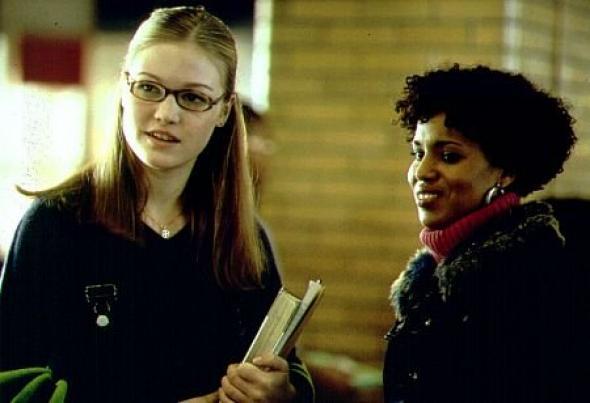Everything about Girlfriend Intervention, Lifetime’s new makeover reality series that premiered last night, feels horribly familiar. For starters, the show is a Queer Eye for the Straight Guy knockoff, in which a quartet of black lifestyle and beauty coaches instruct their dowdy white fixer-uppers how to dress, rap, and do African dance. “Trapped inside every white girl is a strong black woman waiting to bust out!” heralds the series intro, with not a trace of irony to be found. Apparently this is what Lifetime thinks of as catering to a more diverse audience, after years of showcasing overwrought movies and series about white women.
But of course Girlfriend Intervention is hardly the first show to reduce black women to neck-rolling, attitude-having, innately stylish stereotypes. When Hollywood has bothered to provide roles for black actresses at all, it has often presented them as sidekicks who whip important white protagonists into shape. Sometimes this stereotype is deployed harmlessly; at other times it becomes downright offensive. With that in mind, here is a catalog of notable past instances of the sassy black friend-as-white person’s (usually unpaid, mind you) life coach, from the benign to the egregious, and beyond.
The Benign
Sister Act, the Whoopi Goldberg vehicle, takes the premise that the white characters, a bunch of nuns, will have their lives inevitably enriched by the presence of a loud black woman (Goldberg’s lounge-singer-turned-murder-witness-in-hiding). When Deloris/Sister Mary Clarence begins to coach the terrible but eager to learn choir, she instructs them to sing with “attitude.” Soon, a traditional performance of “Hail Holy Queen” has become a hip, gospel-infused rendition that enchants the nuns and entices inner city youth into the church.
But Sister Act is rare in that the black woman is the protagonist, not a sidekick. Goldberg is in command of nearly every scene, and Deloris’ own personal journey is as crucial to the story as the journey to greater hipness taken by the nuns. (Plus, the nuns return the favor by helping to save Deloris from the mob.)
In contrast, the Dynamites, a Supremes-inspired trio of fabulous, singing black ladies, provide backup to Tracy Turnblad (Nikki Blonsky) in 2007’s Hairspray. In the Motown-tinged “Welcome to the ’60s,” they assist Tracy as she takes her homely mother Edna (John Travolta) on a full-tilt shopping spree and makeover, offering soulful, sage beauty advice:
One could view Hairspray—and the original version, a cult classic from 1988—as an egregious act of cultural appropriation: The film focuses on overeager white teenagers who bring black dances to the white masses. But John Waters’ story is also about the unifying nature of music and the fight for civil rights, and it has a self-awareness and sense of irony about the whiteness of its protagonist. This is another benign use of the sassy black assistant stereotype.
The Egregious
On the more cringe-worthy end of the spectrum, there’s the pre-Olivia Pope role that Kerry Washington played in Save the Last Dance. She’s Chenille, sassy black friend and confidant to Julia Stiles’ clueless Sara. In an exchange that could have been plucked directly from the script of Girlfriend Intervention, Chenille helps Sara get ready for a night out at a hip hop night club:
Chenille: “You need to take off that 5th grade dance lookin’ top.”
Sara: “It’s from the Gap!”
Chenille: “It’s country, and you look country in it!”
With help from Fairy Godmother Chenille, Sara is transformed into a slightly hipper version of herself, ready to conquer the club and dance triumphantly among the predominantly black and urban crowd. While Washington has charm and grace for days, the part is still embarrassing.
Worse still was the first Sex and the City movie, in which the writers cast Jennifer Hudson as Carrie Bradshaw’s resourceful personal assistant. At least this time the character is drawing a salary. But her character has no existence beyond helping Carrie get her life together following a disastrous wedding-day ditching by Mr. Big. As “Louise from St. Louis,” Hudson knows all the thrifty tricks to help scatter-brained Carrie live stylishly within her means—and Carrie is grateful that Louise can “hook her up.”
It’s worth noting that in the short-lived prequel series, The Carrie Diaries, Larissa, a hip fashion editor who takes the teenaged Carrie under her wing, serves a similar purpose as the sassy black friend—but she’s not only set apart, somewhat, by her British background, she also has a life apart from Carrie.
The Lampoons
The sassy best friend trope is so familiar by this point that it has been lampooned many times. There are multiple spoofs in the Not Another Teen Movie and Scary Movie franchise, for instance, and the recent rom-com parody They Came Together gives us Wanda (Teyonah Parris), the purposefully underwritten black best friend to Molly (Amy Poehler), and a cheerleader on Molly’s road to romance. There’s even a makeover scene that would make the ladies of Girlfriend Intervention proud.
But perhaps the best skewering of the trope came from an excellent early episode of 30 Rock. Liz Lemon is coached on her personal and professional problems while seated on a plane next to Oprah—the real-life epitome of the black woman guru who serves as spiritual counselor to many white women. Liz is typically awkward as Oprah happily gives her advice, offering to come down to 30 Rock to deal with Liz’s co-workers personally. In a biting twist, “Oprah” turns out to be a precocious pre-teen: Liz took one too many anti-anxiety drugs prior to the flight and hallucinated the world-famous media mogul. The girl, not realizing Liz’s mistake, helps solve all of her problems anyway, because, well, she’s sassy and smart like that.
